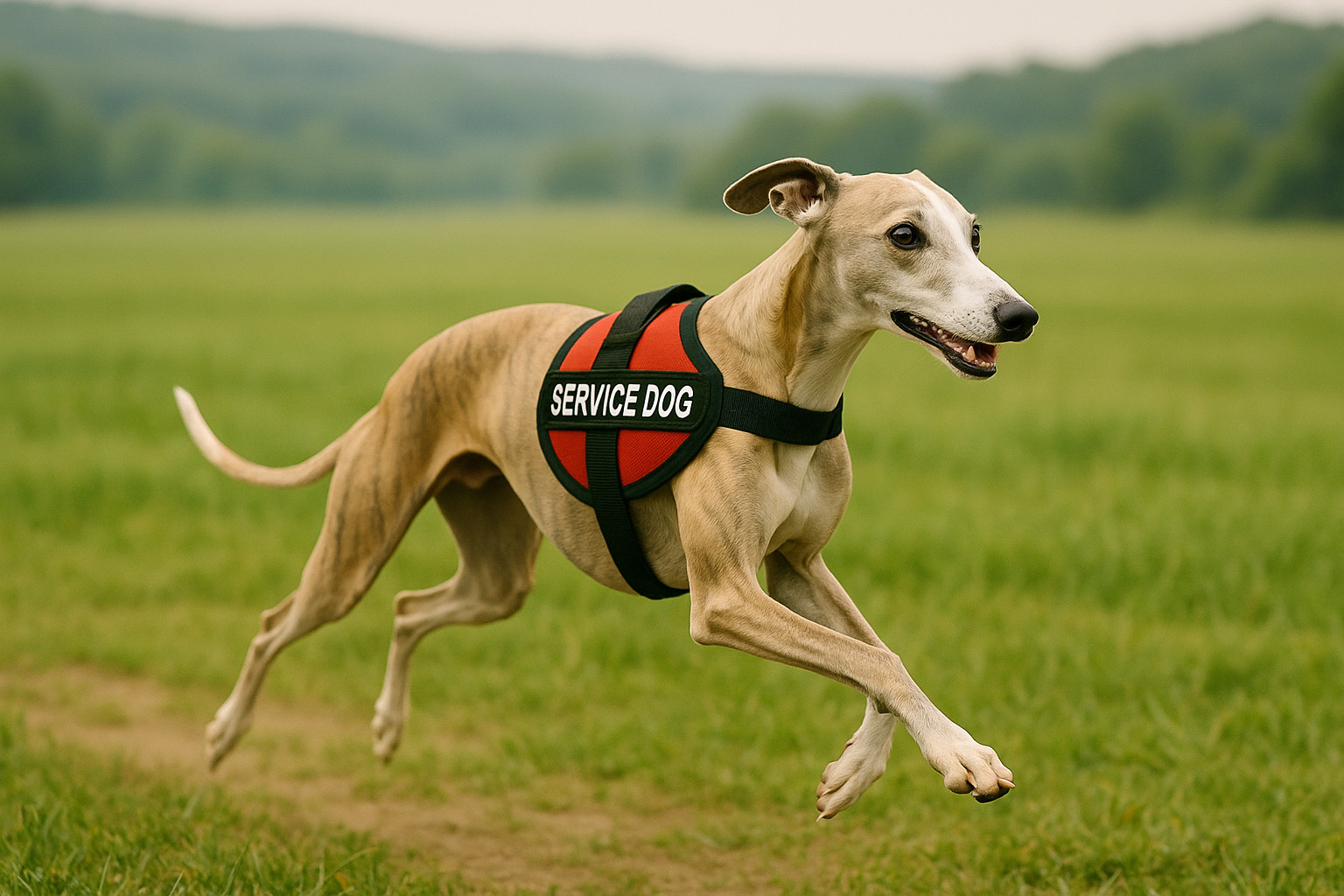Whippet as a Service Dog

Whippets, known for their elegance, grace, and remarkable speed, have been cherished companions for centuries. While their primary historical role centered around hunting and racing, their potential as service dogs is a topic of interest to many considering this breed for assistance roles. In this comprehensive overview, we will explore the various attributes of whippets in the context of service work, examining their physical characteristics, temperament, suitability for different types of service work, health considerations, and overall trainability.
Whippet Overview
Originating from England, the whippet is a medium-sized sighthound admired for its sleek build, gentle nature, and athletic prowess. Historically bred for hunting small game such as hares, whippets are renowned for their speed and agility. As companions, they are quiet and affectionate, forming strong bonds with their families, which are crucial traits in service dogs.
Physical Characteristics
The whippet’s physical attributes present both strengths and challenges for service work. Typically weighing between 25 to 40 pounds and standing 18 to 22 inches tall at the shoulder, whippets are lightweight and agile. This makes them ideal for certain types of service tasks that do not require heavy lifting or substantial physical strength.
- Size and Build:
- Lean and aerodynamic, allowing for quick movements and precise actions.
- Their moderate size enables them to navigate through various environments without being overly cumbersome.
- Energy Levels:
- Possess bursts of high energy, especially during play or running, but are generally calm and composed indoors.
- Require regular exercise to maintain their physical and mental health but appreciate downtime and relaxation.
- Coat and Grooming:
- Short, smooth coat, which is easy to care for and ideal for people with allergies. However, it provides minimal insulation against cold weather.
While the whippet’s size and energy levels are advantageous in certain contexts, their build makes them less suited for tasks involving physical pressure or prolonged hard labor.
Temperament and Attitude
One of the whippet's standout characteristics is its exceptional temperament. Whippets are known for their gentle, friendly disposition and strong attachment to their owners, which are essential qualities in a service dog.
- Temperament Traits:
- Affectionate and loyal, they form strong bonds with their handler, facilitating effective communication and responsive behavior.
- Generally reserved with strangers but rarely aggressive, making them predictable in new or public settings.
- Behavior Traits in Public:
- Naturally calm, they are competent in stressful environments such as crowded places, provided they are socialized appropriately.
- Whippets are sensitive, detecting emotions in their humans, which is beneficial for psychological support roles.
Despite their gentle nature, whippets can sometimes exhibit a prey drive—owing to their history as hunting dogs—requiring proper training and management in environments with small animals.
Types of Service Work
While whippets may not traditionally fit into all service dog categories, they excel in areas where their unique skills and attributes shine.
- Emotional Support and Psychiatric Service:
- Ideal for therapy roles, providing comfort and companionship due to their affectionate nature.
- Useful in psychiatric settings, supporting individuals with anxiety or PTSD by sensing emotional changes and offering a calming presence.
- Medical Alert:
- With training, they can be effective in alerting handlers to conditions like low blood sugar or upcoming seizures, benefiting from their acute senses.
- Mobility Assistance:
- Not suited for heavy mobility tasks, such as pulling wheelchairs or acting as physical braces due to their slight build.
Whippets excel in roles requiring gentleness, empathy, and a quiet presence, proving useful in environments where their speed or strength is not the primary requisite.
Health Considerations
Health is a vital aspect of evaluating a dog's suitability for service work. Whippets are generally healthy dogs but have specific concerns that potential handlers should consider.
- Common Health Issues:
- Predisposed to certain conditions like heart disease (e.g., mitral valve disease), eye problems, and hip dysplasia, although less than larger breeds.
- Sensitive to anesthesia and certain medications, requiring careful veterinary oversight.
- Longevity and Maintenance:
- Typically, whippets have a life span of 12 to 15 years, offering a long service potential if health is well-managed.
- Require regular health checks to prevent and manage hereditary conditions.
Their overall health and relatively moderate care requirements make whippets a viable option for service roles, especially when their specific health needs are met with vigilance and care.
Training and Suitability
Training a whippet requires understanding of the breed's intelligence, sensitivity, and independent nature. Effective training balances guidance with respect for the breed's traits.
- Trainability:
- Intelligent and eager to please, but may demonstrate independence requiring gentle, consistent training methods.
- Positive reinforcement works best, capitalizing on their desire to bond and please their handler.
- Challenges:
- Their sensitive nature may require patience and reassurance, especially during early training phases.
- Socialization is crucial to harness their potential in varied environments, mitigating any potential prey drive.
With patience, whippets can adapt to complex commands and scenarios, flourishing in environments where their inherent traits are appreciated and nurtured.
Summary of Whippet
In evaluating the whippet as a service dog, several key points highlight the breed’s unique suitability:
- Strengths:
- Excellent temperament and affectionate nature, ideal for emotional support and psychiatric roles.
- Moderate size and agility are advantageous in certain service scenarios.
- Generally healthy with manageable care needs.
- Weaknesses:
- Less suitable for physically demanding tasks due to their slight build.
- Sensitive nature requires patient and understanding training approaches.
- Ideal Service Roles:
- Best suited for emotional support, psychiatric service, and certain medical alert tasks where their empathy and sensory skills are beneficial.
Understanding the whippet's traits provides a comprehensive guide to those considering this breed for service roles, emphasizing a thoughtful alignment of their natural abilities with the specific needs of the service work intended.











